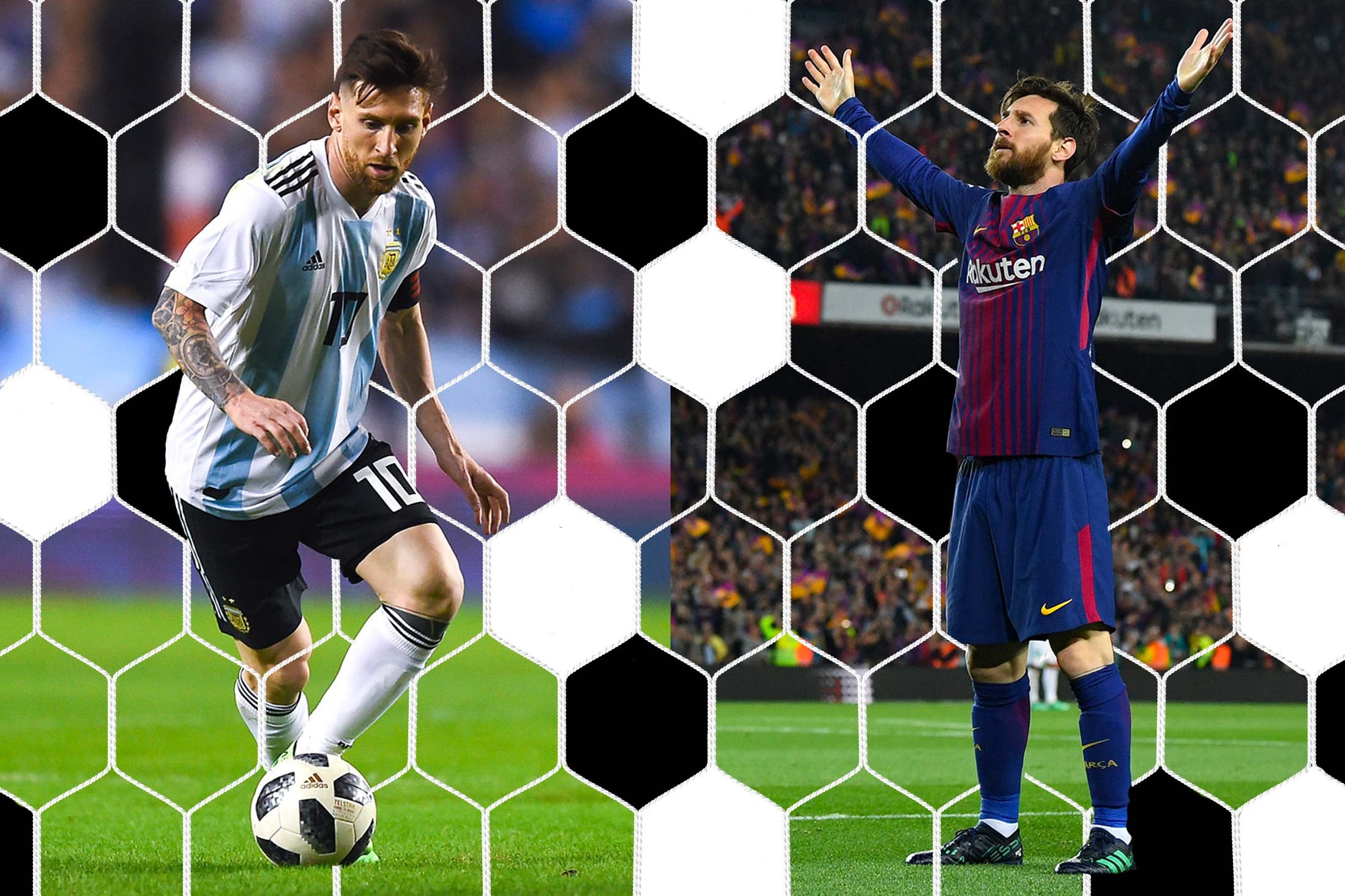Let’s get this out of the way up front: It doesn’t matter if Lionel Messi wins the 2018 World Cup.
He is the greatest soccer player of all time, and he will be whether he hoists the trophy July 15 or his Argentina team bombs out of the group stage in ignominy. He has lapped the field. If, next year at Barcelona, Messi duplicated the statistics of Diego Maradona’s best-ever European season, the drop from his typical numbers would be so precipitous that we’d start packing his bags for MLS. If you don’t think he could do it on a hot, muggy night in the Vila Belmiro, as Pelé did, then you haven’t watched many highlights from the 1960s.
An Argentina victory in Russia would be a nail in a coffin that was sealed up and buried years ago. The people demanding that Messi climb to the peak of his profession before they crown him are looking at the wrong peak. His accomplishments week in and week out in La Liga and the Champions League are a better showcase of his prodigious talent and singular genius than a monthlong quadrennial tournament could ever be.
The World Cup isn’t what it used to be. In the days of Maradona and Pelé the tournament was the rare chance to see players from both Western and Eastern Europe and South America battling head to head. It was, to put it simply, the greatest showcase of high-level soccer in the world.
But a number of changes in the past 30 years have allowed European club soccer to leap past the international game, among them a relaxation of quotas of foreign-born players allowed on rosters and the European Court of Justice’s 1995 Bosman ruling that allowed for free movement of players between clubs. The biggest factor, though, has been the ocean of money that’s pushed down the fabric of the soccer universe like a great gravity well, funneling all the world’s most talented players into fewer leagues and fewer clubs within those leagues.
The coaching staffs of those clubs have a greater ability to customize their rosters and the better part of the calendar year to instill their tactics (not to mention their fitness regimens, nutritional programs, sleep schedules, mindfulness strategies, etc.). The end product has a speed and sophistication that its international cousin can’t match within its patchwork of games and practices broken up by long international flights.
Compared with the club game, international matches can lack rhythm and sophistication. Defenses are often simplified into bunker-and-pray schemes. Offenses can stagnate as teammates unfamiliar with one another’s tendencies wait for their stars to set everything in motion. Defending champion Germany is one of the favorites in Russia less because of the heights it might reach than because it’s thought to have the highest floor. It’s a lot easier to imagine the teams that could beat the Germans—a loaded France, popular dark horse Belgium, a resurgent Brazil—blowing up before they make it to the tournament’s closing stages.
International soccer, once the least-cloistered version of a too-cloistered sport, is today defined by the struggle against its own limitations. A Belgium team overflowing with attacking talent and central defenders tries to patch up its flanks by converting once-promising attacking talent Yannick Carrasco into a wingback. Senegal must decide whether to try to lift some of the creative burden off Sadio Mané or bolster the defense behind him. Uruguay has to figure out how to balance the guile of its young creative midfielders with the phalanx of tough guys they’ve traditionally used to fill the ranks behind Luis Suárez and Edinson Cavani.
At the club level, the solutions are easier: Buy a new player, or complain that your board won’t give you the money to fill the hole. In the international game, a manager must tap into his inner MacGyver. The World Cup asks trained professionals to assemble 32 different Rube Goldberg machines, all of which are supposed to accomplish the same task. While Germany’s Joachim Löw gets machined parts in triplicate, Panama’s Hernán Darío Gómez must make due with a ball of twine and a set of rusty circular-saw blades. One of these arrays is a lot more likely to be successful, but who among us isn’t a little curious to see what happens with that twine-and-saw-blade contraption?
At its worst, the World Cup gives us a template-driven game, indistinguishable variations on defensive-minded soccer, the better to plug your players in and run them out with little preparation. At its best, we get to see unique solutions like Marcelo Bielsa’s ludicrous-speed Chile from 2010 that set the tone for much of this decade’s tactics or Jorge Luis Pinto’s smothering Costa Rica that surrendered two goals in five games in 2014. These teams were beautiful, imperfect machines. They didn’t win the World Cup, but hardly anyone wins the World Cup. Eight countries have split the 20 tournaments held thus far. The top five favorites in 2018—Brazil, Germany, Spain, France, and Argentina—are all past winners.
What the World Cup lacks in technically astute soccer it makes up for by combining all the best parts of March Madness and the Olympics into one world-stopping spectacle. The correlation between quality of play and entertainment value in sports is an imperfect one; the Houston Rockets’ iso-heavy offense could be at once unstoppable and stultifying to watch. And FIFA obviously isn’t worried about quality, or it wouldn’t have voted to further dilute the playing field by moving to a 48-team field in 2026.
An expanded field won’t improve the World Cup quality, but it will provide more opportunities for it to surprise and excite us. Lionel Messi doesn’t need the World Cup to prove he’s the best. That’s OK. The World Cup doesn’t need Lionel Messi to be at its best either.
